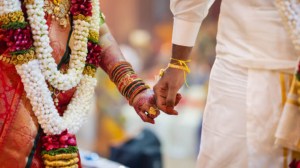India democratic since Vedic times, had no aristocracy like in Greece: ICHR note
The note, circulated among Union ministries, underlines that the ancient democratic traditions explain the "survival of the Hindu culture and the civilisation in the face of the 2,000 years of invasions by alien ethnicities and cultures".
 Criticising the UGC circular to educational institutions, CPI(M) general secretary Sitaram Yechury demanded it be immediately withdrawn. (Representational image)
Criticising the UGC circular to educational institutions, CPI(M) general secretary Sitaram Yechury demanded it be immediately withdrawn. (Representational image)India has been practising democratic traditions since the “Vedic times” when villages developed a hierarchy of self-governing institutions such as “panchayats and khaps”, according to an Indian Council of Historical Research (ICHR) concept note on Constitution Day that has been been criticised as an attempt to negate the country’s challenge of “caste-based social hierarchy”.
The note, circulated among Union ministries, underlines that the ancient democratic traditions explain the “survival of the Hindu culture and the civilisation in the face of the 2,000 years of invasions by alien ethnicities and cultures”.
“This (the survival of Hindu culture) became possible because the Hindu mind from the beginning addressed the central question of how to weld this vast multiplicity that is India into a single larger community and from ancient times a geo-cultural definition has been given to this entity, rashtra, Bharata…” the note stated.
The note, also circulated by the UGC among higher education institutions requesting them to organise lectures on themes exploring India’s democratic traditions, went on to add that the “Bhartiya context of governance” had a crucial difference with that of traditions in Greece or Rome.
“There was no aristocracy in India like, say, in Greece. The Hindu state rarely presented that high degree of centralisation associated with the Roman empire… ,” it said.
“(In India) there was no concentration of the prestige of birth, influence of wealth and political office which made social organisations autocratic and aristocratic,” the note said.
Criticising the UGC circular to educational institutions, CPI(M) general secretary Sitaram Yechury demanded it be immediately withdrawn.
In a statement issued last Friday, the CPI(M) said the ICHR note was a “negation of the reality of Varnashram and the caste-based social hierarchy that is a major challenge in the evolution of our modern democracy”.
“The UGC chairperson negates the Constitutional requirement of democratic consultation with the elected state governments in the sphere of higher education and has directly approached the unelected RSS-BJP appointed governors to pursue this agenda,” the CPI(M) added.
Apart from sending the circular to educational institutes, UGC chairperson M Jagadesh Kumar has also written to state governors to make the Constitution Day initiative a success.
The themes chosen by the UGC for the Constitution Day lectures range from “Harappans: the pioneering architects of the democratic system in the world” to “Ancient Indian value system and concept of Kingship” and “Khap Panchayats and Democratic Traditions in Haryana”.
Prof Kumar said recent archeological excavations at Rakhigarhi and Sanauli reveal that the roots of people’s self-governance date back to at least 5,000 BCE.
“Whether the existence of two kinds of states janapada and rajya or the two assemblies called sabha and samiti forming essential features of the government – all indicate that the ancient form of governance in India was democratic, contrary to the general belief that it was monarchical,” he said.



- 01
- 02
- 03
- 04
- 05




























